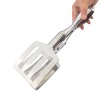ballman6711
Member
I finally got a set of check weights to verify my scale. But I do have a question or two.
First, why do you want to use tweezers when handling them? Do the oils on your skin change what the weights weigh?
Second, if you were to touch them, would something like isopropyl alcohol clean them, like cleaning the pivot points on a scale?
I haven't opened them yet, but it's looking like a pair of tweezers will be added to my loading bench.
chris
First, why do you want to use tweezers when handling them? Do the oils on your skin change what the weights weigh?
Second, if you were to touch them, would something like isopropyl alcohol clean them, like cleaning the pivot points on a scale?
I haven't opened them yet, but it's looking like a pair of tweezers will be added to my loading bench.
chris



